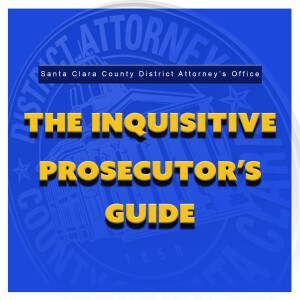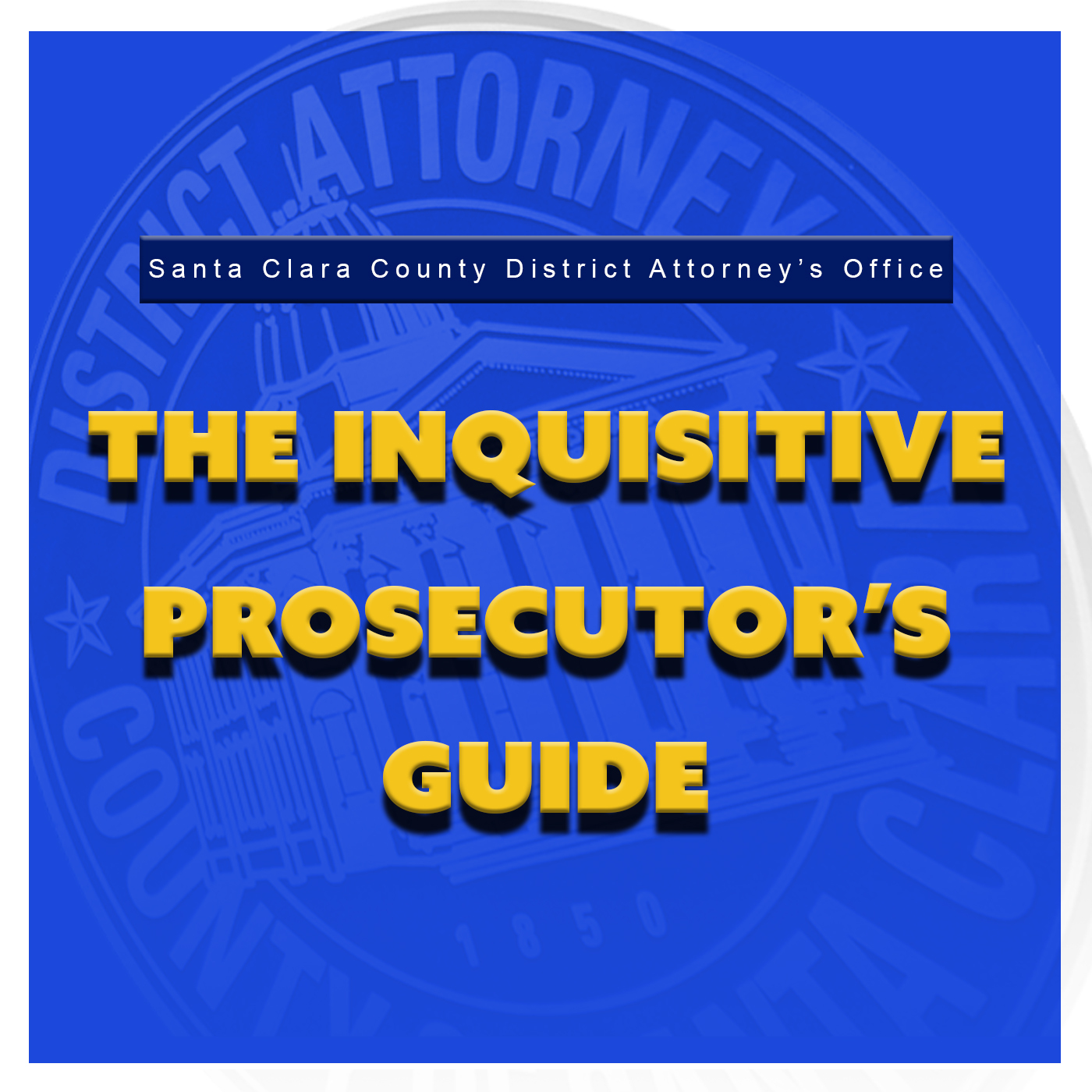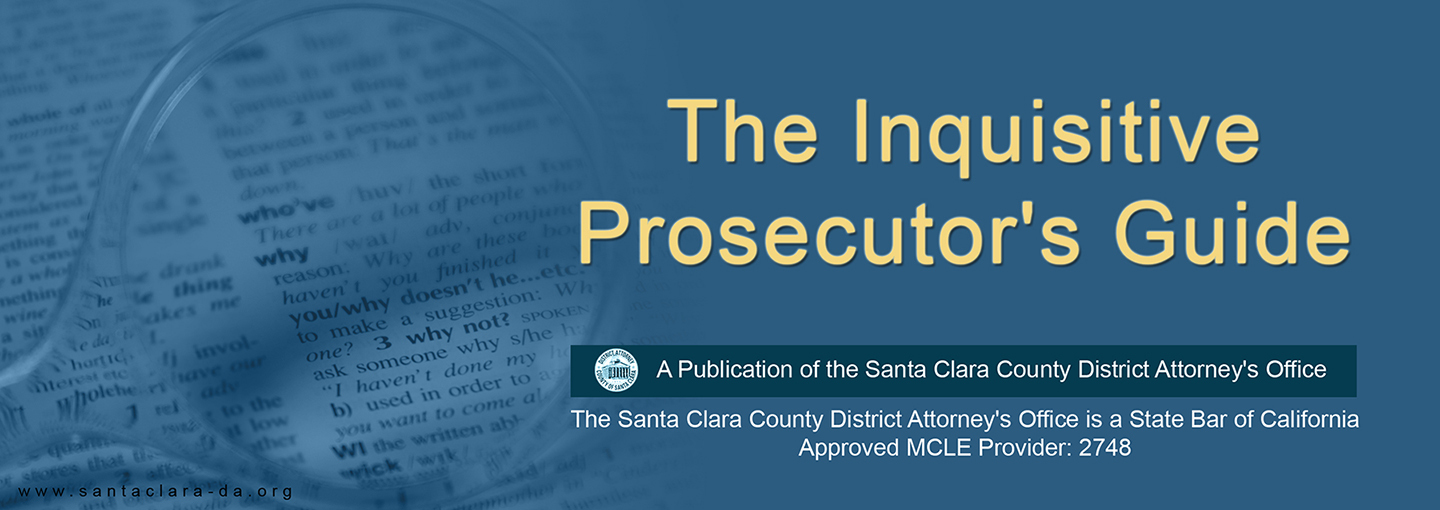Episodes

Monday Dec 02, 2019
2019-IPG-42 (ALADS, SB 1421, & “BRADY LISTS”)
Monday Dec 02, 2019
Monday Dec 02, 2019
2019-IPG-42 (ALADS, SB 1421, & “BRADY LISTS”)
This Inquisitive Prosecutors Guide discusses the California Supreme Court case of Association for Los Angeles Deputy Sheriffs v. Superior Court of Los Angeles County (2019) 8 Cal.5th 828, the modification to the Pitchess statutes made by Senate Bill 1421 (SB 1421), and the respective impacts of both on various issues relating to prosecutorial disclosure obligations. The accompanying podcast features a conversation with discovery expert, Santa Clara County Assistant District Attorney David Angel and will attempt to answer over a dozen questions raised by the case and SB 1421, including: (1) Can, must, or should law enforcement agencies provide “Brady tips” to prosecutors? (2) Can prosecutors pass on to defense attorneys “Brady tips” received from law enforcement agencies without complying with the Pitchess procedures? (3) Can law enforcement agencies provide information about officers who might be witnesses in a future prosecution? and (4) What peace officer personnel files do or don’t remain confidential under SB 1421? The accompanying podcast will provide 80 minutes of general MCLE credit.

Tuesday Sep 24, 2019
2019-IPG-41 (IMPEACHMENT WITH CONVICTIONS & MISCONDUCT OF MORAL TURPITUDE)
Tuesday Sep 24, 2019
Tuesday Sep 24, 2019
2019-IPG-41 (IMPEACHMENT WITH CONVICTIONS & MISCONDUCT OF MORAL TURPITUDE)
In this edition of IPG, we address the various issues that arise when seeking to impeach a witness or defendant with prior convictions or misconduct. Among the issues discussed: (i) when a witness can be asked about conduct underlying a felony conviction involving moral turpitude for purposes of impeachment; (ii) when a person can be impeached with a felony conviction that has been subject to relief pursuant to Penal Code sections 1203.4 et seq.; (iii) what information a prosecutor must know or have before questioning a defendant about a prior conviction; (iv) when a witness can be impeached with noncriminal misconduct of moral turpitude; (v) whether a defendant or witness is entitled to bring out the fact the impeaching conduct resulted in a dismissal or an acquittal; and (vi) when a defendant or witness can successfully assert the Fifth Amendment privilege as to questions about pending criminal conduct being offered to impeach. The accompanying podcast will provide 75 minutes of general MCLE credit.

Friday Nov 02, 2018
2018-IPG-39 (NEW RESENTENCING PROVISIONS OF PC § 1170(d)(1))
Friday Nov 02, 2018
Friday Nov 02, 2018

Monday Aug 06, 2018
2018-IPG-38 (OBTAINING CELL SITE INFO: CARPENTER)
Monday Aug 06, 2018
Monday Aug 06, 2018
This IPG discusses the United States Supreme Court decision in Carpenter v. United States (2018) 138 S.Ct. 2206, a case deciding whether a warrant is required to obtain cell site location information (CSLI), and its potential impact on law enforcement’s ability to obtain CSLI. Among the issues discussed: (i) Does this decision have any real impact on the ability of law enforcement in California to obtain CSLI without a warrant – considering that the California Electronic Communication Privacy Act already generally requires a warrant for electronic communication information? (ii) Will this decision impact a prosecutor’s ability to subpoena third party records in general when a defendant has a privacy interest in the third-party records? (iii) If exigent circumstances exist, can the government obtain either historical or real-time CSLI without a warrant?

Thursday Jul 12, 2018
Thursday Jul 12, 2018
2018-IPG-37 (LIMITS ON PROSECUTORIAL CONTACTS WITH REPRESENTED & UNREPRESENTED PERSONS)
In this edition of the Inquisitive Prosecutors Guide, we discuss the barriers the Sixth and Fifth Amendment impose on prosecutorial contact with represented persons as well as the new rules of professional conduct governing contact by attorneys with represented and unrepresented persons (California Rules of Professional Conduct [“CRPC”] Rules 4.2, 4.3, and subdivisions (b) and (c) of Rule 3.8) going into effect in November of this year. Among the questions discussed: When can prosecutors or law enforcement contact persons whose Sixth Amendment right to counsel has attached? When can prosecutors or law enforcement re-contact persons whose Fifth Amendment right to counsel has been invoked during custodial interrogation? Does new CPRC rule 4.2 change the currently existing rule (CPRC 2-100) governing contact with represented persons in any significant way? And when can prosecutors communicate with charged but unrepresented persons and/or negotiate plea bargains with such persons?

Friday Jun 15, 2018
Friday Jun 15, 2018
2017-IPG-36 (PRIVACY INTERESTS IN RENTAL CARS (BYRD) & THE CURTILAGE (COLLINS))
This IPG (in conjunction with Points and Authorities) discusses two recent search and seizure cases from the United States Supreme Court. The first is a case addressing whether an “unauthorized” person who was allowed to drive a rental car rented by another has a reasonable expectation in the rental car (Byrd v. United States (2018) 138 S.Ct. 1518. The second is a case addressing whether the automobile exception allows for a warrantless entry onto the curtilage of a home to search a vehicle which officers have probable cause to believe is stolen (Collins v. Virginia 2018 WL 2402551).

Thursday Sep 21, 2017
2017-IPG-34 (HOPSON AND WASHINGTON)
Thursday Sep 21, 2017
Thursday Sep 21, 2017
2017-IPG-34 (HOPSON AND WASHINGTON)
This IPG discusses two cases involving the Confrontation Clause-related issues. The first is a case from the California Supreme Court that reads like a law school hypothetical highlighting the potential pitfalls of introduce statements of accomplices for purportedly non-hearsay purposes such as impeaching a defendant. It also provides an interesting discussion of the limits on what evidence can be introduced when a defendant “opens the door” to allowing in testimony that would otherwise be inadmissible over a Confrontation Clause objection. (People v. Hopson (2017) 3 Cal.5th 424.) The second is a California appellate decision more solidly locking in the principle that the Aranda-Bruton rule does not apply when the statement of the co-defendant sought to be introduced in a joint trial is nontestimonial. (People v. Washington 2017 WL 3866413.)

Wednesday Sep 06, 2017
2017-IPG-33 (PROPOSITION 64 - LEGALIZING MJ)
Wednesday Sep 06, 2017
Wednesday Sep 06, 2017
This IPG podcast focuses on providing comprehensive answers to the questions most likely to arise in the investigation, charging, and prosecution of marijuana-related crimes in the wake of Proposition 64 (The “Control, Regulate and Tax Adult Use of Marijuana Act (‘the Adult Use of Marijuana Act’)” and Senate Bill 94. Among the questions posed: 1. Is all possession of marijuana now legal? And, if not, what is the impact of Prop 64 on the laws previously governing possession, possession for sale, cultivation, and sale of marijuana? 2. When will the odor of marijuana or possession of a small amount of marijuana allow for detentions of persons, or searches of vehicles, persons, or homes? 3. What is the impact of Prop 64 on whether an alert by a drug-sniffing dog provides probable cause to search? and 4. What is the impact of Prop 64 on marijuana-related prosecutions pending at the time of its passage?

Monday Jul 31, 2017
Monday Jul 31, 2017
This joint IPG and Points and Authorities production discusses the recent appellate decision in Association for Los Angeles Deputy Sheriffs v. Superior Court 2017 WL 2962901, which purports to address the question of whether it violates the Pitchess statutes for law enforcement agencies to voluntarily provide “Brady tips” to prosecutor’s offices. A discussion of some of the issues raised by that decision is also included.

Thursday Jun 01, 2017
2017 IPG#30 (TROMBETTA-YOUNGBLOOD MOTIONS)
Thursday Jun 01, 2017
Thursday Jun 01, 2017
This 60 minute podcast covers five related topics. First, it discusses the principles governing motions to dismiss based on the loss or destruction of evidence (Trombetta-Youngblood motions). Second, it discusses how hearings on these motions should be conducted. Third, it discusses what, if any, obligations exist on the part of law enforcement to collect evidence. Fourth, it discusses how prosecutors should respond to defense requests for examination and testing of evidence seized by law enforcement. Fifth, it discusses the ability of the prosecution to comment on the fact that evidence was released to the defense for testing. This podcast features San Francisco Assistant District Attorney Allison Macbeth, who co-authored the IPG memo accompanying the podcast.

